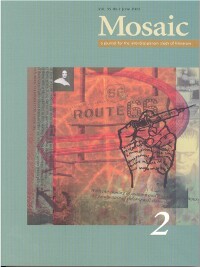Issue 35.2
Overview

General Issue
Published: June 2002
View the issue introduction or see the issue summary and contents below.
10 essays, totalling 192 pages
$15.00 CAD
This general issue of Mosaic contains nine essays of a particularly interdisciplinary emphasis. The issue opens with a roundtable discussion about interdisciplinary studies with Editor Dawne McCance, Sander Gilman, Linda Hutcheon, Michael Hutcheon, and Helen Tiffin. The disciplines with which the essays in this issue engage include medicine and the history of medicine, biology and evolutionary biology, anthropology and economics, ecocriticism, and a range of philosophical approaches. The essays include examinations of works by Jamaica Kincaid, Emily Carr, Washington Irving, René Bretonnayau, Audre Lorde, and Mary Shelley.
Roundtable on InterdisciplinarityDawne McCance The following roundtable discussion took place at the University of Queensland, Australia, on 12 June 2001, as the concluding session of the No Sense of Discipline conference. The discussion brought together Mosaic editor Dawne McCance (DM) with conference plenary speakers Sander Gilman (SG), Linda Hutcheon (LH), Michael Hutcheon (MH), and Helen Tiffin (HT). Mosaic is pleased to publish the roundtable here. | |
Mary Shelley’s Anti-Contagionism: The Last Man as “Fatal Narrative”Anne McWhir This essay reads Mary Shelley’s narrative of a plague-ravaged world in terms of contemporaneous medical theories of disease transmission. It argues that disease functions both literally and metaphorically in The Last Man, that Shelley’s epidemiological ideas inform her treatment of intertexts, and that the novel offers a critique of Romantic ideology. | |
Audre Lorde’s The Cancer Journals: Autopathography as ResistanceWilliam Major This essay examines Audre Lorde’s illness narrative, The Cancer Journals, through the lens of postmodern theories of identity. By raising the ethical question of whether contemporary theory forecloses on the autonomy so important to people suffering from serious illness, this essay contributes to ongoing debates over identity, subjectivity, and agency. | |
Genetic and Cultural Selection in The French Lieutenant’s WomanEva Mokry Pohler John Fowles’s The French Lieutenant’s Woman asserts that cultural evolution, like genetic evolution, is a horizontal process involving elements of hazard and causality, so that history is partly inherited and partly contingent. It is only through apparently insignificant impulses or whims that individuals achieve anything close to existential freedom. | |
Entre l’art de guérir et l’art d’écrire: René BretonnayauAndrzej Dziedzic In this essay, close textual analysis of René Bretonnayau’s work uncovers various strategies that he used to translate medical knowledge into poetic discourse. The essay demonstrates, by this case study, the interconnectedness of literature and medicine in sixteenth-century France. | |
Kant’s Dinner Party: Anthropology from a Foucauldian Point of ViewPeter Melville Kant believed that the study of “man” would prove to be the final resting place for all philosophical inquiry. This essay argues that his Anthropology is most valuable for exposing the figure of “man” to its limits, where it paradoxically possesses nothing and has no character but the uncanny ability to create its own character and that of its society. | |
“The Tasteful Traveller”: Irving’s The Sketch Book and the Gustatory SelfMichael Schnell Washington Irving’s The Sketch Book shares forms, themes, and functions with some new arts of its time, those of preparing, enjoying, and writing about food. Thus The Sketch Book comments upon and exemplifies a new sort of production that provokes rather than satisfies the wish to consume. | |
“Roving Englishwomen”: Greece in Women’s Travel WritingEfterpi Mitsi This essay examines British women’s travel writing on Greece as the configuration of gender, imperialism, and Hellenism. Despite disproving accounts of male travellers, women writers complied with imperialist operations constituting modern Greece as the orient. To encounter and claim the past, they represented the present as alien and degenerate. | |
Image, Text, and Spirit: Kate Braid and the Paintings of Emily CarrCy-Thea Sand Within this analysis of Kate Braid’s poetic discourse as a response to Emily Carr’s paintings in the text To This Cedar Fountain, this essay demonstrates how painter and poet subvert the matter/spirit binary to articulate a fundamental connection among spirituality, creativity, and the material conditions of women’s lives. | |
The Garden and the World: Jamaica Kincaid and the Cultural Borders of EcocriticismSusie O'Brien This essay critically analyzes some recent trends in ecocriticism, focussing in particular on ecocritical moves to embrace a more multicultural agenda. Through a reading of Jamaica Kincaid’s My Garden (Book):, the essay argues for a more critically nuanced approach to negotiating the (dis)connections between ecocriticism and multiculturalism. |